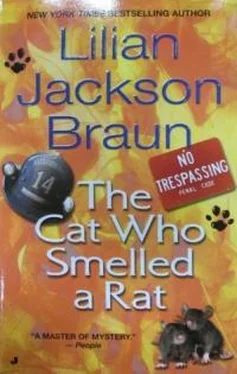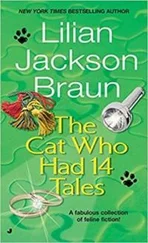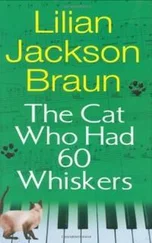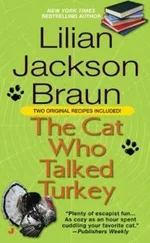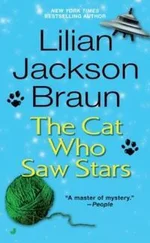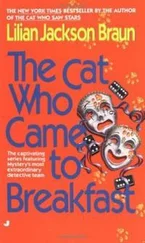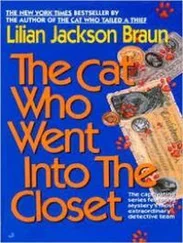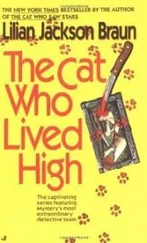Qwilleran phoned Polly and related the incident, then waited for her reaction.
She paused. “I know I should feel chagrined, but… why do I find it comic? I hope you had hidden the glove box.”
“Have no fear. What do you think about the Citizens’ Fire Watch?”
“Better to light one small candle than to curse the darkness, as the saying goes. Will you volunteer for a patrol?”
“Most likely I’ll ride shotgun with Wetherby.”
Two topics of conversation occupied downtown Pickax on Tuesday: the Citizens’ Fire Watch and the loss of Eddington Smith. Townfolk were filled with sorrow on the one hand and hope on the other as they shared their thoughts at the post office, a civic meeting place. Built in Moose County’s heyday, when Pickax expected to become a northern Chicago, its interior walls had been covered with murals in the 1930s-a federal project to give work to unemployed artists during the Great Depression. The post office and the bookstore were the city’s two tourist attractions.
Qwilleran bought some postage stamps-and listened: “The college president volunteered to take a fire patrol.”
“Those two new doctors signed up.” “In our family we have three on patrol. I just pray: Dear Lord, don’t let the wind rise!”
“The kids wanted to stay home from school so they could fire-watch with their daddy.”
“Eddington was a nice little old man, but he didn’t eat right, and I told him so.”
“Can’t be healthy-breathin’ all that dust.”
“Wonder what’ll happen to his cat.”
“Wonder what’ll happen to his books.”
Qwilleran, still astonished at the terms of Eddington’s will, walked to Book Alley to view his inheritance. The bookstore glittered in the middle of the block like a crown jewel. On either side were nineteenth-century storefronts with tall windows. On one side were Albert’s Dry Cleaning and Granny’s Sweet Shop. She knew everyone’s weakness; Mr. Q liked dark chocolate with nuts. On the other side were Gilda’s Gift Shop and Brenda’s Unisex Hair Salon. Qwilleran patronized an old-fashioned barber with a revolving barber pole in front of his shop.
A sign in the bookstore window said CLOSED. It was dark inside, but the movement of a waving tail could be glimpsed in the gloom. Winston had been fed and was doing his dusting chores as usual.
Albert saw Qwilleran and opened the door. “Mr. Q! Your pants are ready!”
Qwilleran walked across the street. “Well, Albert, what are we going to do without Eddington?”
The dry cleaner shook his head. “That store was the lifeblood of this block. People came from all over to see it. Not too long ago a real estate guy from Bixby came around and wanted to buy it. Not a chance! Then he wanted to buy the storefronts, but our landlord wouldn’t sell. No telling what they’d do-tear the whole block down, maybe, and build a strip mall.”
“Winston seems to be all right.”
“Yes, I see a girl coming to feed him.”
“We should run a sob story about Winston with his photo, and find a new home for him,” Qwilleran said.
“If you want to go in and see him,” Albert said, “Edd always left the key under the doormat at the back door.”
“May I use your phone?” Qwilleran called the photo lab at the Something and requested a shot of Eddington Smith’s cat for the next day’s deadline. “Not a mug shot,” he stipulated. “He looks too ferocious. Preferably broadside, showing the plumed tail. The key is under the doormat at the rear, and be sure the cat doesn’t run out.”
Before leaving the block Qwilleran had a last look at the bookstore, wondering if-possibly-the college would accept the property and set up a work-and-learn project for students. Not a bad idea! Polly could give the benefit of her library science training, and Kirt could lecture on rare books. There was plenty of time to consider it. How long the estate would be in probate was anyone’s guess.
The bookseller’s funeral was a small one, as the modest old man would wish. Eddington Smith was laid to rest in a hilltop cemetery beyond the city limits-alongside his father. The elder Smith had been a door-to-door book salesman, bringing dictionaries and encyclopedias to countryfolk who had little schooling. Years later their purchases turned up in estate sales and then Eddington’s shop, many of them as good as new.
The pastor of the Little Stone Church officiated at the funeral, and Qwilleran said a few words:
“Books were Eddington’s life. Although he was not a reader himself, his mission was to supply books to readers and find readers for books. His building on Book Alley had been his grandfather’s blacksmith shop, and it was a long leap from shoeing horses to binding books, but it was part of Edd’s passion for booksto make an old book new again.
“As a person he was more of a friend than a businessman-always generous, steadfast, and kind. Whenever one of his customers passed on, he would say, There is a better land-far, far away.’ And his seamy face would radiate a moment’s joy as if he heard the song of angels. As we say farewell to Eddington, let us bid him godspeed to a better land-far, far away.”
The few mourners walked quietly down the hill to their cars.
Qwilleran did Polly’s grocery shopping, ensuring himself an invitation to dinner, and then went home to read his newspaper. On the editorial page he found a letter that surprised him:
To the Editor-Compliments to the Shafthouse Preservation Initiative on their success in having the abandoned mines declared historic places. We should all cheer Saturday’s ceremony that dedicated the bronze plaques. Our mining heritage is unique. Let us not forget the miners’ villages that surrounded the mines-the miners lining up at dawn to climb down a ladder into the lower depths-working like dogs for ten hours-climbing back up a thousand feet of ladder with blackened faces and empty stomachs-sometimes perishing in mine explosions that left whole villages fatherless. When we admire the cubistic architecture of the shafthouses, let us not forget the human sacrifice that allowed vast fortunes to be made for a few.
It was the signature that took him by surprise: Don Exbridge of Suffix Township. To dramatize the moment, another pot of geraniums fell from the balcony railing and crashed on the living room floor. He looked up to see a boldly impudent Koko enjoying his mischief.
There was no point in scolding; it had been folly to put the plants there in the first place. It was one of those “decorator touches” that Qwilleran succumbed to once in a while simply because Fran was glib, glamorous, and Brodie’s daughter.
He swept up the debris and returned to his newspaper, only to discover the editorial page torn into shreds. What’s more, Koko was right there, waiting to take credit for his depredations. The cat had oblique ways of communicating, and this could mean one of two things: Either he wanted shredded paper in his commode instead of the expensive dustproof litter that came in large bags… or he was saying that Don Exbridge’s letter was a fake.
Qwilleran agreed with the latter. The sentimentality, the caring about heritage, even the word “cubistic” were all out of character for the bottom-liner who couldn’t care less about history, environment, and the arts. Who was his ghostwriter? And what was it all about?
Qwilleran discussed the matter with Polly when he reported for dinner.
“I’ll read a letter to the editor, and you guess who wrote it.”
She guessed several members of the historical society and the genealogy club.
“Don Exbridge!” he announced.
“What’s happened to him?” Polly gasped.
“Either he’s been hit on the head, or he’s going to be a father for the first time, or he’s hired a spin doctor to give Donex & Associates a new corporate image. What’s on the menu tonight?”
Читать дальше
